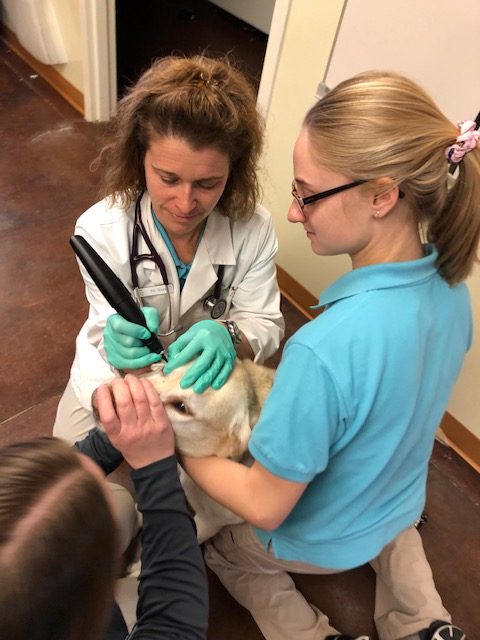Benefits of Cryotherapy
By Dr. Maria Krenz, DVM – ZimmVet-763-856-4848

Cryotherapy is a treatment that has been around for years in both the human medical field as well as veterinary care to treat masses, skin lesions, skid tags, eye tumors and more. In recent times, the technology has become more precise and easier to use in the veterinary industry.
What is Cryotherapy
Cryotherapy is a procedure that uses extreme cold to destroy tissue. The process is called cryo-necrosis, or tissue destruction by freezing. Cryotherapy freezing is set to -80 degrees Fahrenheit to destroy the cells. Nitrous oxide is the active ingredient used in cryotherapy, instead of liquid nitrogen, which is what most people are familiar with. Liquid nitrogen is not used because the temperature achieved is lower that nitrous oxide and results are not as precise. Modern day Cryotherapy tools with nitrous oxide look like a large pen and can apply the cooling effect very precisely.
Anesthesia-Free
One of the biggest benefits of Cryotherapy is that it can be used to remove small masses without the use of anesthesia or cutting of the skin. The cold temperatures apply a local numbing effect, which allows the pet to be treated with minimal discomfort. Cryotherapy can be used to treat a wide range of benign skin lesions on pets such as adenomas, skin tags and eyelid tumors. Another benefit is the cost of treatment is significantly lower as compared to surgical removal with anesthesia.
Side Effects
Potential for side effects are minimal, but a pet may lose pigment in the area causing a dark-colored pet to have a light spot. If all of the cells are not completely killed, the mass could grow back requiring additional treatments. With any defect in the skin, there is the potential for secondary skin infection.
Is Cryotherapy for my Pet?
It is not recommended to use Cryotherapy on known or potentially cancerous masses. Your veterinarian will want to surgically remove the entire mass, so the cells can be looked at by a pathologist. At ZimmVet, we offer cryotherapy. The first step would be to make an appointment at ZimmVet to have your pet’s masses examined by a doctor to determine the best course of action.
Disclaimer: This written content is meant to be educational and is not medical advice. Always consult a veterinarian about medical advice for your pet.


